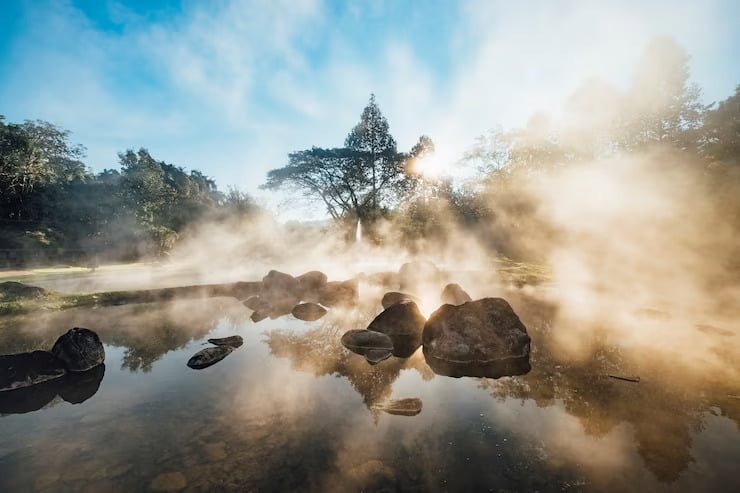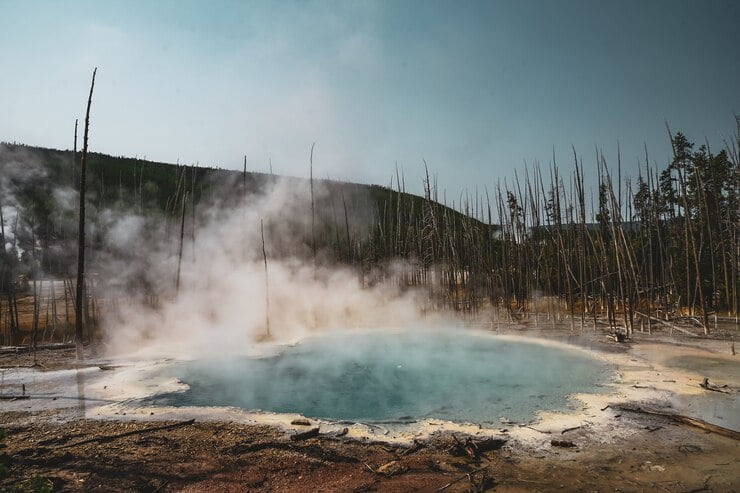Is It Worth It To Live Near A Hot Spring?
by Arnab Dey How to Guides 14 February 2023

Prospective home buyers may experience doubt when considering a move into mountain properties such as Glenwood Springs, known for its natural hot springs.
The primary reason for this hesitancy is the sometimes overpowering smell of hydrogen sulfide that results from gasses dissolved from sulfuric minerals within these deep wells of hot water rising toward the surface.
As these particles move closer to the surface where the temperature is cooler, they unbind and are released, creating a tell-tale rotten egg smell that can be difficult on the nose.
Not all hot springs give off this unpleasant odor, but the more powerful the smell, the greater the hydrogen sulfide content within the hot spring. Believe it or not, this benefits those who enjoy a hot soak, as sulfur provides many benefits for the body, and a greater quantity amplifies these effects.
However, is it worth living with the smell to enjoy the benefits of nearby hot springs?
The Value of Living Near a Hot Spring
For those that are not severe nose-wrinklers, nature’s thermal spas make ideal neighbors. You can gain significant health benefits from easy access to hot springs, so it is very much worth living near a hot spring, more so one that emits a strong sulfur odor (from a health perspective).
Now, if you are particularly susceptible to smells, you may disagree, but consider the body’s incredible ability to adapt to the external environment when making a decision.
When approaching a malodorous hot spring, the most pungent whiff comes with the first intake of breath . . . and then progressively improves. Many people worry about the adverse effects of breathing in this chemical, which is a valid concern as high concentrations can be very deadly.
As a result, avoid experimenting with wild springs and ensure that you live in the vicinity of springs officials have verified as safe.
Over time, your olfactory senses will acclimate to the smell, and you may not even notice it. When that happens, you can enjoy the fantastic perks of a soak in waters ranging from 102 to over 115 degrees!
The Benefits of a Hot Spring Soak

Hot springs are excellent sources of natural healing and can positively influence the body and mind. Here are some of the many advantages of soaking in a hot spring:
1. Relaxation
Even hot baths can evoke a sense of soothing relaxation, and hot springs take that to another level. For many, this is the main reason for a visit, and living nearby means you can access hot springs virtually anytime to soak off the stress of a long day.
Studies demonstrate that immersion in hot water calms the mind, reducing stress and anxiety while inviting peacefulness. The subsequent cooling process as your body leaves the heated environment and experiences cool air is part of this experience. It can improve sleep quality and make it easier to drift off.
2. Soothes Pain
The relaxation effect partly results from the loosening and soothing of muscles. Heat has long been an effective treatment for some types of muscle pain or injuries, and the heat from hot springs has the added benefit of blocking pain receptors, which alleviates discomfort.
This phenomenon is why muscles, joints, and even more significant ailments such as arthritis and fibromyalgia can feel better after a soak. Of course, it is always a good idea to consult a medical professional before pursuing hot spring soaking as a treatment option.
3. Enhances Circulation
Minerals such as calcium within these unique waters can aid in oxygen flow as they are absorbed, and warm water, in general, promotes this increased circulation.
As a result, heart function and metabolism are improved, which can ensure the body’s vital organs receive sufficient oxygen to perform at optimum levels and that the body can efficiently convert energy, respectively.
4. Good for the Skin
Significant amounts of silica in spring water can result in softer skin, and the sulfur content can even aid long-term skin conditions such as psoriasis, eczema, acne, and rashes.
Hot water generally helps unclog pores, and other minerals such as magnesium and potassium can eliminate toxins, improve your complexion, and promote healthy skin. Selenica serves as an excellent antioxidant, as well.
5. Decongestion
Steam from hot water, when inhaled, helps thin mucus and soothes nasal passageways, making breathing easier. Coupled with the sulfur inherent in springs, this is an excellent natural remedy to help with chest congestion, allergies, or breathing symptoms related to the common cold.
Safety Risks
Even though hot springs can be great in many ways, there are a few inherent dangers that you need to be aware of before you begin your soaking experience.
First, water temperatures are often very high, which poses a risk of dehydration and hyperthermia, which means the body is overheating. This can damage the body’s organs, including the brain. To combat this risk, you can soak in 10 or 15-minute increments with a cool-off break in between.
In addition, some springs exceed temperatures of 110 degrees Fahrenheit and above, which can result in second or third-degree burns or even death.
This is a greater danger if exploring wild springs, so you should always test the water before climbing in and proceeding deeper with extreme caution. The same is true for approved hot springs, as even these temperatures can reach dangerous levels.
Pregnant women should avoid hot springs during this time, as elevated temperatures can cause birth defects, especially at higher temperatures. It is a good idea to consult with a health professional to discuss any health risks of hot water soaking, even using hot tubs. The same is true for anyone with health issues, as elevated temperatures can cause complications in some cases.
The Bottom Line
Despite the odor, living near a hot spring can be a significant advantage, particularly if you enjoy having a hot soak. There are many health benefits and advantages relating to the water and inherent minerals, and the body can acclimate to the smell so that you do not even notice it.
Remember, not all hot springs emit a strong odor, so living near a hot spring does not necessarily mean you will be subject to it. However, check with a medical professional before using thermal waters if you are pregnant or have medical conditions for your safety.
Read Also:



































































































